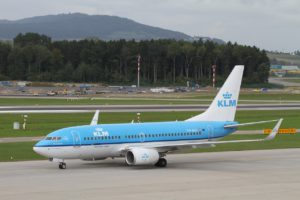Breda University of Applied Sciences (BUas) published ‘Evaluation of KLM’s Climate Plan’ on 5 June 2024. Milieudefensie, the study’s client, released the research as follows: ‘KLM is deliberately causing more CO2 emissions with diverted flights. Emissions will not be 48% less in 2030, but 6% more.‘
The cause is the large proportion of KLM passengers flying via Schiphol (60%), which is responsible for 78% of all KLM’s emissions. If KLM focused on direct connections from Amsterdam, CO2 emissions would be reduced by 30%.
This is unfortunate because the study is interesting for several reasons. We discuss three of them.
KLM’s own climate targets are not met.
First, the study[1] shows that KLM is not going to achieve its climate targets. KLM has had a climate plan[2] since 2022 that should result in CO2 emissions being reduced by 12% by 2030. This makes KLM a positive exception in the aviation industry. Only three airlines have drawn up a climate plan with concrete CO2 targets. All credit for that! But if you put yourself ahead of how sustainable you are, you should not be surprised when outsiders test your sustainable ambitions. BUas notes that the current ambitions are not feasible. If you have the ambition to become a net-positive organisation (and KLM wants that), you will have to adjust your strategy so that you do achieve the aspirations. But KLM is not doing that; KLM is betting on ‘more of the same’.
KLM’s climate strategy rests on four pillars, the first three of which have been worked out in concrete terms: fleet renewal, operational efficiency (optimisation of routes and weight reduction) and application of Sustainable Airline Fuel (target is 10% by 2030). The fourth pillar, ‘other measures’, has not yet been worked out in concrete terms. Of course, you can reduce some CO2 emissions with these measures, but it is too little. If KLM wants to achieve the climate goals it has set itself, it will also have to take a critical look at its strategy. And that will hurt because KLM’s success is determined by its hub strategy – the diverters.
Amsterdam Airport Schiphol’s hub function is overrated.
This brings us to the second reason this research is interesting: Schiphol’s hub function is overestimated. Air France/KLM itself repeatedly stresses how important that ‘dual hub’ function is[3] . The two main arguments Air France-KLM mentions are that both airlines have a strong ‘point to point’ network and the two airlines complement each other on destinations to which only one of the two airlines’ flies. But it fails to mention that the planes are, on average, 70% filled with transfer passengers: passengers who do not fly directly (point to point) but via the Paris or Amsterdam hubs. The economic contribution of these transfer passengers is limited, and it certainly does not outweigh the nuisance of noise, climate damage and an overloaded airport. The argument that the loss of transfer passengers jeopardises network connectivity is only partly valid. SEO Economic Research conducted several studies in recent years into the economic importance of KLM and Schiphol’s hub function (Leisure, hub function, social importance)[4] and each time concludes that the hub function was overestimated. A loss of transfer passengers affects network connectivity to a limited extent, the supply of (especially intercontinental) flights decrease by only 5%. Incidentally, as early as 2001 economists argued that Schiphol’s hub function is overestimated[5] , a conclusion that was carefully ignored by several Rutte cabinets.
Indeed, letting go of that hub function could well offer benefits: less nuisance for the surrounding area, less operational pressure on the airport and less climate damage – which in turn would make room for other economic activities such as building houses, building roads and starting new businesses. For Air France-KLM, this is obviously a break from its strategy of the past 20 years, but it is also about time for a trend change. If not because of the climate, then certainly because of shareholders.
Shareholders cannot possibly be satisfied.
There we find the third reason why this report is interesting. One that is not immediately obvious but makes perfect sense is the share price. KLM has been performing poorly on the stock market for years. Despite a profit of almost €1 billion over 2023, the share is trading at an ‘all-time low’ of €7.94 (dated 23 July 2024)[6] .

If both revenue and net profit are up but shares have fallen 80% since 2020, it means only one thing: shareholders have no confidence in them. Of course, there are extenuating circumstances; the Corona pandemic hit all airlines hard, geopolitical conflicts throw a spanner in the works, staff shortages (both technical and cabin) and a weakly performing cargo division[7] . Conditions that affect almost all airlines, and yet other airlines see their share price rise. So what is wrong with Air France-KLM that puts its share price under such pressure? The most obvious reason is the extreme dilution of the share capital[8] . To keep Air France-KLM in the air (literally), the number of shares outstanding has risen from 85 million in 2019 to 263 today – an increase of 209%. This is in stark contrast to other airlines that also issued more shares, but not to this extent. Lufthansa issued 79% more shares, British Airways 64%, easyJet 61% and Ryanair just 3%. When you then also report that no dividend will be paid this year, you should not be surprised that investors invest their money elsewhere.
CEO Ben Smith predicts that through “revenue initiatives and cost cutting, operating profit will improve to €2 billion by 2028”[9] . The familiar recipe in the absence of a clear strategy: raise the price of your product and cut (staff) costs. A ‘race to the bottom’ that a ‘legacy’ airline like Air France-KLM is never going to win. Investors already get this, but now Air France-KLM still needs to.
KLM has redefined its mission: “Creating memorable experiences on the planet we care for”. Those ‘memorable experiences’ you will ultimately have to create yourself; KLM, as the carrier to and from the destination, is merely the facilitator. And if KLM really cares that much about the planet, it will have to consider other strategic options. The current strategy is more of the same: ticket prices up, costs down, fleet renewal, weight reduction – it is not enough to meet the climate goals! Apart from external pressure – this will only increase: lawsuits due to climate damage and noise pollution by local residents, claims due to greenwashing, discussions with Schiphol on forced shrinkage, and so on.
It’s time to take a closer look at BUas report and do the maths. How much profit is to be gained if 70% transfer passengers are no longer frenetically adhered to? This really doesn’t have to go to 0% but run through some scenarios (or have SEO do it, they have experience with it). How much climate gain is there? How much less noise pollution? How much do you save on buying new aircraft? Will your share price (finally) move?
To be clear, I am not against flying. It offers fantastic experiences, is good for the economy, promotes understanding between people and peoples AND enlarges our world. But let’s prevent the whole (or half) world from having to fly via Amsterdam!
[1] Environmental Defence fact sheet: (v)liegen en bedriegen, 30 May 2024
[2] KLM Climate Action Plan: https://www.klm.nl/en/information/sustainability
[3] The hub model, presentation Pierre-Henri Gourgeon, deputy CEO of Air France-KLM
[4] 2015: Economic importance hub function. 2019a: Leisure transport importance. 2019b: Social importance of Schiphol network. 2019c: Network quality monitor and state guarantees. 2021 SCBA analysis and welfare analysis.
[5] In article ESB ‘Future of aviation’, M.G. Leijsen Hub premiums in European civil aviation, 2001
[6] Google market review Air France KLM 23 July 2024
[7] VEB: AF-KLM brims with self-confidence, but whether performance is sustainable remains to be seen, 19 December 2023
[8] VEB: Despite record figures, AF-KLM quotes at historically low share price, 4 March 2024
[9] Investor day AF-KLM, 14 December 2023


